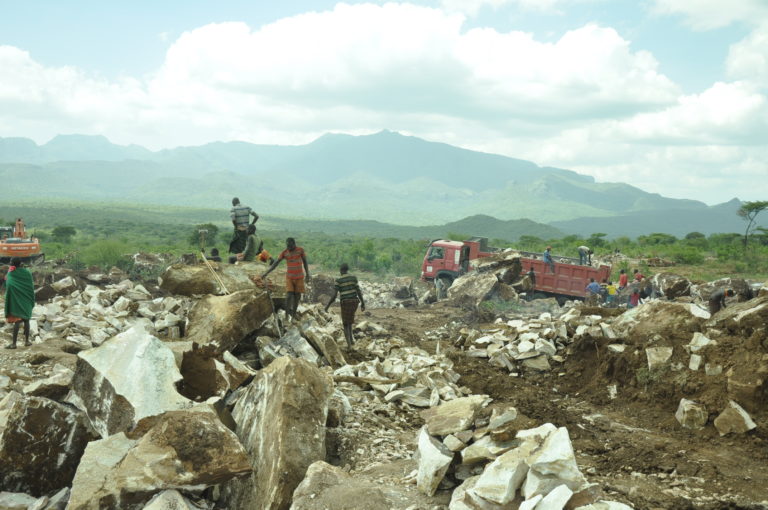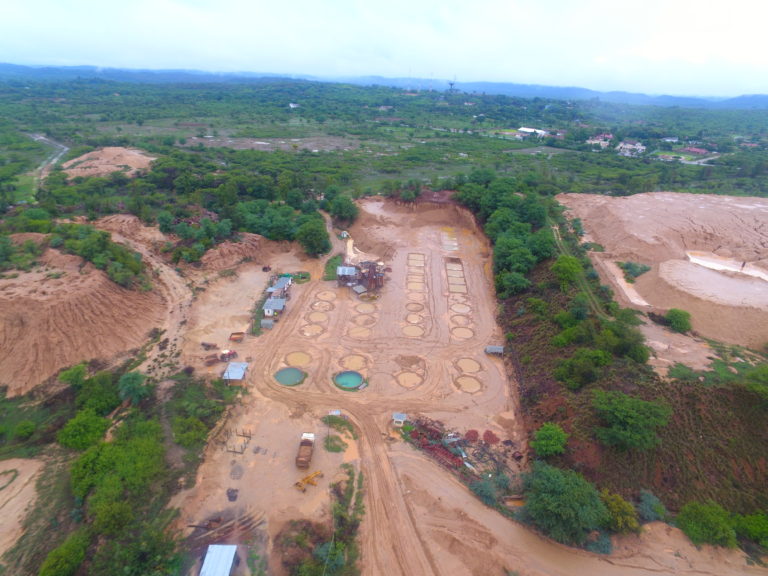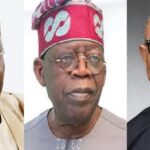Billions of investments into mining projects have breathed new life in Uganda’s once-neglected Karamoja region, creating thousands of jobs in mineral-rich heartlands near the Kenyan border but the investment rush has also brought new problems, fueling environmental degradation, rights violations, and land grabbing, threatening livelihoods of millions of indigenous Karamojong people.
Ugandan authorities are investigating the latest deadly clash in the impoverished gold mining sub-county of Rupa Moroto district which happened in late April, that left a 28-year old local defense personnel dead and forced several hundred locals to flee their homes after armed assailants staged a daytime raid and stole gold ores, worth millions of Ugandan shillings. Days earlier, dozens of policemen from Uganda’s mineral protection police who had been deployed to secure the lucrative gold mining village abandoned their positions, due to rising attacks, blamed on assailants, who usually cross from Kenya’s Turkana region.
In a region long inhabited traditionally by cattle-herders, the rush to get the region’s precious minerals gold, limestone, and marble, is uprooting people, damaging key water sources, and stirring social unrest. Locals talk of being displaced from their ancestral farmlands by land grabbers while others are now suffering from many diseases, including skin infections and diarrhea, blamed on consuming water from contaminated water bodies, as some miners use hazardous chemicals including mercury to extract gold.
Impact On The Environment
“We have been invaded by foreigners who don’t care about our livelihoods,” said Anne Napeyo, a 30-year old mother in Rupa. “Many of our people are getting wounds on their skin because the water here is contaminated”
Thousands in Karamoja have taken jobs in the mines while others have become “artisanal diggers” digging their own holes and tunnels, risking cave-ins and other dangers in pursuit of buried treasure, local leaders say. In addition to hazards such as contaminated water bodies, mining activities are leaving behind gaping pits, which now dot vast areas as artisan miners leave these behind in search of new grounds. Small children sometimes drown in these pits, while local farmers have lost livestock.
Sacred grounds known as ‘Akiriket’ are also being destroyed. According to the Karamoja traditional setting, every community is socially organized to have its own Akiriket from where the assemble for social events from initiations to naming happens. Community leaders say the minerals are turning into a curse.
“We want development but it can’t be at the expense of our peoples’ lives and livelihoods,” said Margerate Lomonyang coordinator of Karamoja Women Cultural Group and Karamoja representative on the multi-stakeholder group for the Extractives Industries Transparency initiative EITI. “Investors are taking advantage of desperate people who are trying to make a living in the mines”
Land Grabbing
A total of 17,083 square kilometers of land area in Karamoja is licensed for mineral exploration and extraction activities, according to official data. In 2018, Chinese mining company Sunbelt was given 3.3 square kilometers of land to set up a $13 million marble mining factory in Rupa sub-county. A year later, the company expanded its operations to cover additional 4.1 square kilometers, ostensibly after a deal with local leaders. Hundreds of families have since been pushed out of their ancestral homes, local officials say. Locals accuse Rupa Community development trust, a community trustee group created three years ago, of conniving with investors to steal their land.
“The community leaders came to us with compensation documents saying they were going to help us demand compensation when investors come,” one local known as Lokol, said “They tricked us to sign them without paying anything, now we have nowhere to go.”
While Sunbelt insists that company representatives went through the right channels to acquire the land, including signing a memorandum of understanding with the local leaders, authorities are investigating the transaction, according to the energy and minerals ministry.
“Sunbelt violated the community members’ rights to fair and adequate compensation in the land acquisition process. They didn’t involve the community members who are the real custodians of the land,” said Lomonyang.
Another company DAO Marble Africa Limited, which operates a mining license to mine marble has been accused by Human Rights Watch for rights violations, including allegations that the company connived and paid off a few local chiefs without compensating the local residents.
Land ownership in Karamoja is under customary tenure and communally owned and managed. This means that land is held in trust by one generation for another with the elders as ‘stewards’. This very unclear land ownership model makes fair compensation a difficult issue as few elders negotiate with the companies for the temporary acquisition of land.
Local Miners Association To The Rescue
Karamoja Miners Association unites miners in the region and was formed to sensitize local mining communities about their rights, help locals demand accountability from their leaders, and seek fair compensation from mining companies.

“We organize miners in groups so that they have a formidable voice and can negotiate for better wages and working conditions from mining companies,” says Simon Nagiro the chairperson of the association. “We have also embarked on interpreting into local languages miners’ rights as enshrined under the mining laws.”
Regions’ Mineral Potential
Karamoja is endowed with a vast array of metallic and industrial minerals that have the potential to be developed commercially. A 2011 survey found that the region contains over 50 minerals including gold, limestone, uranium, marble, graphite, gypsum, iron, wolfram, nickel, copper, cobalt, lithium, and tin. With 61% of Karamoja’s 1.2 million people living in poverty, the region’s mineral potential holds the promise of economic development.
Karamoja Mining At A Glance
- A total of 17,083 square kilometers of land area in Karamoja is licensed for mineral exploration and extraction activities.
- The region is endowed with over 50 different minerals, including marble, limestone, gold, silver, copper, and iron.
- 26 companies currently have exploratory or mining rights in the region.
- The sector comprises both large-scale and artisanal and small-scale miners.
The Constitution of Uganda 1995, vests all mineral resources in the hands of government but article 244 provides that minerals shall be exploited taking into account the interests of landowners and local governments and further states that land will not be deprived of a person without prompt payment of fair and adequate compensation. Under articles 39 and 41, every Ugandan has a right to a clean and healthy environment and as such can bring an action for any pollution or improper disposal of wastes.
The Mining Act, 2003 is the principal law that governs mining in Uganda. Under Section 4 of the act, a person may acquire the right to search for and mine any mineral by acquiring a license issued by the commissioner. Section 15 provides for payment of compensation to owners of private land for damage done to the surface of the land or to any crops, trees, buildings, or for livestock injured or killed by the negligence of the holder of the license or an agent. Section 43 provides that a mining license shall not be granted unless the proposed mining program takes into proper account environmental impact assessment and safety factors.
Section 110 further makes it mandatory for every license holder to submit a costed environmental restoration plan which requires approval by the National Environment Management Authority. The Act however does not clearly address the regulation of mining activities by different government agencies and how they can follow up with the investors regarding royalties. This is worsened by the limited role local government plays in the regulation of mining activities due to resource constraints.
Rights Of Indigenous Groups In Uganda
According to Minority rights group international, Karamojong pastoralists, are some of the most marginalized minorities in Uganda, isolated economically and politically. Commonly stereotyped by their compatriots as violent and backward, other Ugandans refer to them as warriors. The African Commission’s International Work Group for Indigenous Affairs also recognizes the Karamojong people as indigenous minority groups in Uganda. However, Uganda does not officially recognize Indigenous minority groups. This lack of formal recognition by the state further disenfranchises Karamojong.
Uganda is a signatory to various international instruments that reiterate the rights of indigenous people. These include; the UN Declaration of the Rights of Indigenous People 2007, the Universal Declaration of Human Rights, the International Covenant on Economic, Social and Cultural Rights, and the UN Guiding Principles on Business and Human Rights. However, the country is still lagging behind in terms of protecting the rights of indigenous people.

“We are empowering communities by educating them about their land and property rights so that they are able to hold mining companies accountable,” says Abaho Herbert a program officer at Resource Rights Africa a local charity organization operating in the region. “We also work with local leaders to put in place by-laws that enable fair wages for miners to avoid being exploited by the mining companies”
Since Belgium-based Africa gold refinery set up a $20 million gold plant in Uganda, the country has become a magnet for gold mining activities, notably in Karamoja. Gold exports fetch $1 billion every year and have overtaken coffee as Uganda’s leading export commodity.
For many local leaders, this rush is the reason for increased insecurity, displacement of locals, and inter-communal clashes. Gold miners are routinely attacked by assailants looking for the highly sought-after metal, bringing back memories of the insecurity that plagued the region at the height of cattle rustling in the 1990s and 2000s. Illegal miners continue to flock to the 7 districts of Karamoja, driving up displacements, clashes over land ownership and shared water bodies.
Food insecurity is also a challenge in the region and reliance on natural resources has rendered livelihoods sensitive to climate change, already a reality manifested inform of recurring droughts, flash floods, and prolonged dry spells.
In June 2021, Uganda’s cabinet approved a draft mining law (Mining and minerals Bill 2019) that imposes steep penalties for violations in the sector, including fines of 1 billion shillings ($278,164.12) and prison terms of up to seven years for those found guilty of environmental degradation, illegal mining among other violations.
The new law will replace the old mining legislation that has been in place since 2003, when the region hadn’t discovered vast minerals, according to Vicent Kedi the commissioner licensing at the Ministry of Energy and Mineral Development.
“The new law will solve issues of non-compliance by mining companies to social and environmental safeguards, ” he says. “We are working with local leaders in the region to continuously monitor mining company operations.
This story was produced with the support of Internews’ Earth Journalism Network’s Indigenous Story Grants




















